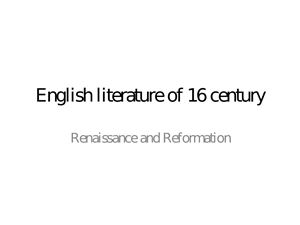Стерлитамак, Россия, 2014 (13 слайдов)
New starting point for the development of English literature, was in 1485, when feudal turmoil was brought to an end and an absolute monarchy of the Tudors was established. There was development of humanistic culture, and English literature entered into the Renaissance. The beginning of this era in England was marked by the introduction of book-printing (1476)
XVI century - the heyday of English humanism, which originated here later than in Italy, met with the Reformation. Classical Literature and Italian poetry have a great influence on English literature. Humanism (from Lat. Humanitas - humanity, humanus - humane, homo - people) - worldview, centered on the idea of man as the supreme value. Humanism consieders human, as a person, his right to freedom, happiness, development and expression of their abilities. Thomas More - an English lawyer, social philosopher, author, statesman and noted Renaissance humanist. Thomas Wyatt - a 16th-century English ambassador and lyrical poet. He is credited with introducing the sonnet into English literature. Christopher Marlowe - an English dramatist, poet and translator of the Elizabethan era. John Donne - was an English poet and a cleric in the Church of England. He is considered the pre-eminent representative of the metaphysical poets. Edmund Spenser- was an English poet best known for The Faerie Queene, an epic poem and fantastical allegory celebrating the Tudor dynasty and Elizabeth I. He is recognised as one of the premier craftsmen of Mode English verse in its infancy, and is often considered one of the greatest poets in the English language. William Shakespeare- an English poet, playwright and actor, widely regarded as the greatest writer in the English language and the world's pre-eminent dramatist. He is often called England's national poet and the "Bard of Avon.
New starting point for the development of English literature, was in 1485, when feudal turmoil was brought to an end and an absolute monarchy of the Tudors was established. There was development of humanistic culture, and English literature entered into the Renaissance. The beginning of this era in England was marked by the introduction of book-printing (1476)
XVI century - the heyday of English humanism, which originated here later than in Italy, met with the Reformation. Classical Literature and Italian poetry have a great influence on English literature. Humanism (from Lat. Humanitas - humanity, humanus - humane, homo - people) - worldview, centered on the idea of man as the supreme value. Humanism consieders human, as a person, his right to freedom, happiness, development and expression of their abilities. Thomas More - an English lawyer, social philosopher, author, statesman and noted Renaissance humanist. Thomas Wyatt - a 16th-century English ambassador and lyrical poet. He is credited with introducing the sonnet into English literature. Christopher Marlowe - an English dramatist, poet and translator of the Elizabethan era. John Donne - was an English poet and a cleric in the Church of England. He is considered the pre-eminent representative of the metaphysical poets. Edmund Spenser- was an English poet best known for The Faerie Queene, an epic poem and fantastical allegory celebrating the Tudor dynasty and Elizabeth I. He is recognised as one of the premier craftsmen of Mode English verse in its infancy, and is often considered one of the greatest poets in the English language. William Shakespeare- an English poet, playwright and actor, widely regarded as the greatest writer in the English language and the world's pre-eminent dramatist. He is often called England's national poet and the "Bard of Avon.

